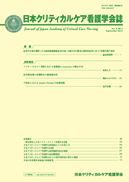Volume 9, Issue 1
Displaying 1-6 of 6 articles from this issue
- |<
- <
- 1
- >
- >|
-
2013Volume 9Issue 1 Pages 1-5
Published: March 31, 2013
Released on J-STAGE: July 02, 2015
Download PDF (331K)
-
2013Volume 9Issue 1 Pages 6-18
Published: 2013
Released on J-STAGE: May 22, 2013
Download PDF (524K) -
2013Volume 9Issue 1 Pages 19-28
Published: 2013
Released on J-STAGE: April 05, 2014
Download PDF (477K) -
2013Volume 9Issue 1 Pages 29-38
Published: 2013
Released on J-STAGE: April 05, 2014
Download PDF (454K)
-
2013Volume 9Issue 1 Pages 39-47
Published: 2013
Released on J-STAGE: April 05, 2014
Download PDF (398K) -
2013Volume 9Issue 1 Pages 48-60
Published: 2013
Released on J-STAGE: April 05, 2014
Download PDF (436K)
- |<
- <
- 1
- >
- >|
